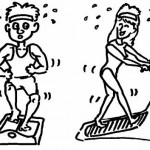How To Conquer Addiction
“Is anyone interested in a game of poker?”
He gestured to a card table. An immediately recognizable chip-case rested on the felt. Atop the case was a brand new deck of Bicycle playing cards. My ears felt hot at the temptation. I desperately wanted to say “Yes.”
I have a gambling problem. I say that now even though I haven’t gambled in three years because I believe that once you’re addicted to something, the addiction never disappears. At best it lies dormant within you until an inopportune moment of indiscretion lets it loose again.
My gambling addiction started in college. I was there on full scholarship, I worked two days a week, and as a result I had a lot of spare money. I was introduced to a regular game, and was quickly hooked. My first night, I lost $15. I remember thinking that it was okay to lose that money — I justified the loss by telling myself that I had spent that money to learn how to play poker. With this single thought, I began a trend of justifying my gambling habit.
For newly two years, I met with this group of friends twice a week and got my poker education. Like anything else, if you do it enough you’re bound to get good at it. Interestingly, I know absolutely nothing about these people except their first names, and that they liked to gamble. That was our common interest, and that’s all that mattered. It wasn’t about making friends, it was about making money.
On my 21st birthday, I took $250 to the Poker Room at the Taj Mahal in Atlantic City. I lost it all within a few hours.
You’d think that logic would step in and tell me I was throwing money away, but I convinced myself otherwise. I wasn’t a bad player, or an addict, I had simply caught a bad run of cards. I justified the loss by reminding myself that I had easily won over $250 in the games I played at school. I was just among a different league of players now, and needed to adjust my play style.
I went back to the casino many times, and I had more success with it. As I became familiar with the other addicts, I learned how to play with them and win. Eventually, I thought that I had become so good at poker that I could do it as my career.
So that’s what I did. I left my day job in early 2004 to begin my new life as a professional gambler. I signed up for an account with an online gambling website and began playing poker 10 hours a day from the comfort of my own apartment.
For a professional gambler, I was thoroughly successful. I could pull anywhere from $300-500 a week. With these results, I imagined that professional gambling was the perfect life for me: I could earn as much money as I did working my day job, but this was a lot more fun!
Naturally, this success didn’t last long.
The gambling site began promoting the 2004 World Series of Poker — I became enchanted with it. I imagined that I could play alongside the Poker Stars at the young age of 21. With a $10,000 buy-in for the tournament, it nearly guaranteed I would be the youngest contestant there. I would be on TV. I would be a feature player and given a weird nickname like “The Kid.” And if I won the World Series, I would win several million dollars, retire at 21, and go down in Poker History.
I became engrossed in the fantasy. Saying “I wanted to go” would be an understatement — I needed to go, so I entered a “Qualifier” for the 2004 World Series of Poker.
To quickly explain the idea behind a “Qualifier” for the WSOP:
- It costs $10,000 to compete in the World Series of Poker.
- Most addicts aren’t willing to drop 10 grand to participate.
- They are, however, willing to drop $220 in a “Satellite.”
- Even more are willing to drop $24 in a “Qualifier.”
A Satellite is a multi-table tournament where the winners get a ticket to compete in the WSOP. For every 55 players in the Satellite, one “WSOP Package” is created. In other words, 55*($220) = $12,100. The site takes $1,100 of this for hosting the Satellite. The remaining $11,000 goes to a player (10 grand pays for the seat in the World Series, and $1000 pays for the trip).
So if 500 players participated in a Satellite, then nine “WSOP Packages” would be created. Consequently, the top 9 ranking players in that particular Satellite tournament would go to the World Series of Poker for the low cost of $220.
For the addicts who think $220 is too much to spend on a low chance at going to the WSOP, there is the $24 Qualifier. This is a ten person tournament where the top player wins a seat in the Satellite. In other words, 10*($24) = $240. The site takes $20 for hosting the Qualifier. The remaining $220 reserves the top player a seat in a Satellite.
I’m sure you see where this is going: In March of 2004, I participated in a Qualifier. I won, and thus received a chance to compete in a Satellite. There were 660 players in this particular Satellite, meaning that the top 12 would go on to the 2004 World Series of Poker.
I logged in to compete in the Satellite at 8pm. I played the best poker of my life for 7 solid hours until 5am. I placed 28th out of 660 players. I did well, but not well enough to walk away with a “WSOP Package.”
Losing the Satellite caused the downward spiral of my poker career. It’s what poker players call “tilt” — you let your emotions affect your game, and lose a lot of money because you’re no longer playing rationally.
I wanted to go to the World Series that year. Since I played rather well in one Satellite, I figured I should try again the next week. I signed up for another Qualifier. I lost. I signed up again, and I lost again. I continued in this manner until I had spent enough money playing Qualifiers that it would actually have been cheaper to simply pay for the seat in the Satellite.
When Saturday came around and I still hadn’t won a Qualifier, I dropped another $220 so I could play in that week’s Satellite. I played horribly, and lost quickly. Once again, you’d think that logic would step in — you’d think that I’d realize that I was literally throwing money away. But the next week I wanted to compete again…
I was addicted. I was no longer gambling as a means of earning income, I was gambling in order to quench my gambling thirst. Thanks to my overwhelming desire to go to the WSOP, I lost everything that I had previously earned from gambling profits. I quickly ended up “in the hole.”
Consequently, my “tilt” condition worsened because I started chasing my losses. Before long I was nearly $5000 in the hole. If I didn’t stop gambling, my situation would keep getting worse.
I finally made the choice to cut my losses and quit. I faced facts: I tried a career as a professional gambler and failed miserably. The money was gone — and it didn’t matter how much I regretted losing it. It had already been done — I made bad choices, and I paid for them.
Conquering my addiction took only one step: Eliminate Temptation.
I cut gambling out of my life. When anyone from my college poker group invites me to a game, I say no. Whenever I’m invited to a night at the casino, I say no. When the person who unknowingly asked a gambling addict “Is anyone interested in a game of poker?”, I said no.
“I heard that you played poker,” he said to me.
“I used to, but I can’t anymore. I have a gambling addiction.”
“I highly doubt you’ll get addicted from just one game,” he insisted.
“Look, I once had a 9-month stint as a professional gambler. It grew into a real problem for me and I had to stop. I made a promise to myself that I wouldn’t gamble again, no matter how harmless it seemed. So ‘No thank you,’ alright?”
In order to truly conquer an addiction, you have to commit to your decision to quit every day — because one moment of indiscretion could lead to a lifetime of regret.
Related Posts
| If you've found this website helpful, please click the PayPal button. You will be helping me pursue my dream career as a writer. Thanks for your support! |














9 Responses to “How To Conquer Addiction”
[…] luthier brought to you using rss feeds. Valuable information for any poker player or poker enthusiast.Here’s a brief portion of the article“Is anyone interested in a game of poker?” He gestured to a card table. An immediately recognizable chip-case rested on the felt. […]
This story hits home for me in terms of addiction because I’m fighting a weight-loss war. I’d say battle except I’ve already succeeded in losing 100 lbs, but have recently put 40 of it back on. The culprit is an overeating habit. It seems a daily commitment to change is exactly what the Dr ordered.
I’ve been reading your site for a little while now, and I’m really glad you’ve started writing again after your month-long absence. This post is another example of why I like this blog. You write about things that are meaningful and applicable, and you’ve inspired me with a number of your posts. Thanks, and keep going strong!
Great article. The best of breed always come with a story, it’s the most powerful way to prove a point, I guess 🙂
That’s a very decisive way to get out of some habits, but what when you can’t effectively eliminate temptation ? Examples could go from bitting nails to as far as procrastination (it IS an addiction, you know =D). It’s tougher when you have to rely exclusively on willpower.
Great article, I’ve recently gone through a tough breakup and this article sadly puts it in a new perspective… I’ve subscribed to your site and am eagerly awaiting more posts like this.
This is a brilliant article. Thanks for posting it. I had a similar (though a *lot* cheaper) problem with MUDs back in the days… I used to play 6-8 hours a day (on top of going to school for most of the day, back then). I also beat it by making a clean decision to just “break off”. Once I’d made that choice, I never connected again, and I’ve stayed off since.
This article explains the idea in a very clear way. Thanks for posting it.
I lost a lot of money a one time playing poker, but I still play. Yup, still in the hole and my story is a lot like his. But I never quit my day job. I pay well and affords me extra spending money. I use the extra and stay within my budget now. So, I believe I conquered my addiction by controlling it instead of letting it control me. Same goes for him only his control comes in saying “NO”. I’ve had a drug addiction at one point, but that is where I now say “NO” as even once is too much there.
[…] let them in. For more information on conquering addictive qualities in your life, follow Cupid to LifeReboot.com. Share: Hide Sites Posted in Tattered Hearts | Tags: addiction, celeb […]
[…] will take a lot of effort and hard work if you’re going to truly conquer addiction. Long after you’ve left your rehab program, you will need to apply yourself daily to see through […]